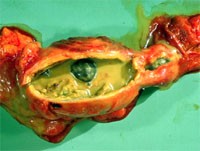Pathology
Description
|
Pathology is the scientific study of diseases (including, for example, infections and cancers) at the genetic, molecular, cellular, and organ levels. It examines how and why diseases develop, what happens to our bodies when we are ill (the disease process), the effects of diseases including symptoms and complications, as well as how an understanding of disease contributes both to the development of diagnostic tests and to better measures for disease prevention.
Students study various disease processes such as inflammation (including infections), wound healing and cancer. They become familiar with examining specimens and using microscopes to recognise the difference between normal and abnormal cells, tissues and organs. Courses offered in Pathology allow in-depth study of areas such as meningitis, tuberculosis, auto-immune diseases, congenital diseases, a variety of cancers, HIV/AIDS, heart disease, asthma, musculoskeletal diseases and the human version of 'mad cow disease'. Studying Pathology at UNSW Pathology is an essential component of all undergraduate programs in Medicine at UNSW. It is also available as a specialisation within the Bachelor of Science, the Bachelor of Advanced Science (Honours) and the Bachelor of Medical Science. Students may gain advanced training by undertaking a postgraduate research program in Pathology. Please refer to the School of Medical Sciences website for current research areas.
Pathology can be studied as
|
|||||||||||










